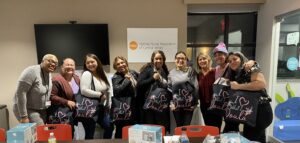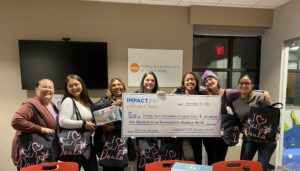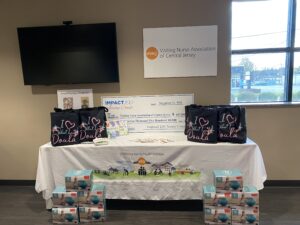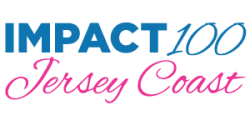By Janet Mazur Cavano

Most mothers will agree that giving birth is one of the most profoundly moving, yet challenging life experiences they will encounter. Imagine then, giving birth in a situation where the medical community does not speak the same language or understand the mother’s culture.
Giving birth is often a difficult experience, but research has shown that worse outcomes are more likely for mothers and babies in at-risk communities. Enter a doula, a non-clinical pregnancy/birth coach who not only speaks the mother’s language, but comes from her neighborhood, and is specially trained to serve as a bridge between her and the medical community. Culturally-sensitive doula care can make a measurable difference.
“A doula is a compassionate coach,” said Colleen Nelson, the vice president of The Children and Family Health Institute of the Visiting Nurse Association of Central New Jersey (VNACJ). “They connect with a woman early in their pregnancy, carry them through their labor and delivery and beyond. They listen to and respect their hopes and fears. They make sure the voice of the mother is heard.”
Thanks to a 2021 $107,500 grant from Impact 100 Jersey Coast, the VNACJ has trained 11 “culturally sensitive” doulas, as part of Monmouth County’s first ever Doula Learning Collaborative. The program is a joint effort between the VNACJ and Jersey Shore University Health Center’s Booker Family Health Center.
The 11 doulas represent the Hispanic, Hatian-Creole, Portuguese and African-American communities. They have completed state-approved training, earned Medicare certification and learned basic business skills, as they will work as independent contractors. The Doula Learning Collaborative will offer them an ongoing network that fosters connections, provides continuing education and enables these women to grow in their practice.
In fact, two of the doulas have connected and become “sister doulas,” meaning they will work together and share clients so they can cover for each other for deliveries when one is not available. Both met with a client separately during the prenatal visits to ensure the woman was comfortable. After a successful delivery, the client reported that thanks to the doula, the experience was less stressful than a previous birth, in which her partner was not included and the staff did not take the time to explain procedures to her.
“We feel that the doulas will empower Black and Hispanic women to feel more in control of their childbirth experience,” Nelson explained.
The ultimate goal of this innovative program is to improve the maternal and infant mortality rates in the most vulnerable communities in Monmouth County. As Nelson explains it, New Jersey ranks 47th in the nation for maternal health outcomes. In addition, Black babies in New Jersey are three times more likely to die in their first year of life than White babies, while Black women die at four times the rate of White women.
“We MUST do better,” Nelson said. “The more people who ask, ‘why is this happening, and what can I do?’ the better. People are uncomfortable when you bring up racism and bias; it’s ok to be uncomfortable. But don’t let it quiet you down! Keep learning and researching and you’ll become part of the movement that says, we have to do better. Community-based doula care can make a huge difference.”
The Visiting Nurse Association of Central New Jersey is a non-profit organization dedicated to helping individuals and families achieve their best level of well being by providing compassionate, coordinated and innovative care in their homes and communities. Contact them for additional information about this program.
Since its inception in 2016, Impact 100 Jersey Coast has awarded more than $2,000.000 in transformational grants to 18 local organizations. A women’s giving circle, Impact has created a forum to raise awareness of the community’s most pressing needs and fund transformational grants for high impact projects addressing those needs. Impact 100 JC has also expanded its giving circles to encompass the richness of ideas, perspectives and the participation of diverse women from a wide range of identities.



Photos courtesy of VNACJ of the first in person Monthly Doula Learning Collaborative meeting

